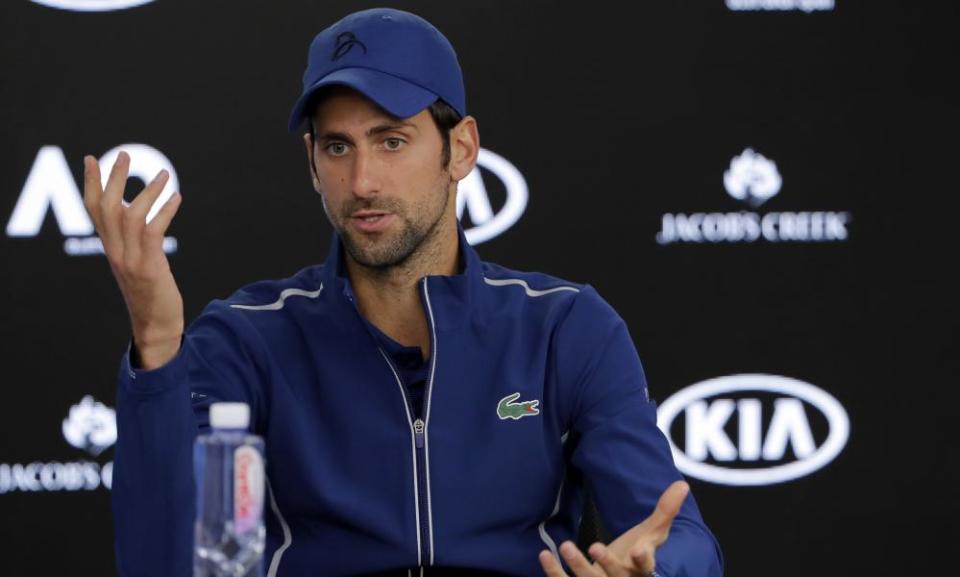Novak Djokovic sparks fears of players' revolt over pay after meeting

Novak Djokovic, the first player to pass $100m in prizemoney, sent a shiver through the Australian Open on an overcast day one when it was suggested he is fomenting a players’ pay revolt that could split the game wide open.
The Serb, a six-time winner here who lives in the tax haven of Monte Carlo, is said to have made the demand for a significant rise in prizemoney at a mandated players’ meeting on Friday, ahead of a tournament already preparing to double prizemoney over the next five years to more than $A100m.
Tennis Australia officials and representatives of the Association of Tennis Professionals were asked, politely, to leave the room, according to a report in the Daily Mail, and Djokovic introduced a lawyer who outlined the case. There was allegedly talk of forming a breakaway players’ union, separate from the ATP, the body headed by Chris Kermode.
Neither Kermode, the ATP nor Tennis Australia were prepared to comment on Monday until they had confirmation of the demands from Djokovic himself.
The former world No1, seeded 14th after a six-month break to heal an elbow injury, is scheduled to open his campaign at Melbourne Park on Tuesday afternoon, against the American Donald Young. He was not available for comment on Monday.
Among players present at Friday’s meeting were Andy Murray, who is convalescing in Melbourne after his hip operation, the defending champion, Roger Federer, who is said to be sceptical about the move, and Rafael Nadal, last year’s beaten finalist. Earlier, the players listened to an outline from Tennis Australia for plans to double prizemoney for the season’s opening major from $A55m to $A100m (£57.2m).
Many leading players regard their remuneration to be out of kilter with other sports, particularly golf. The riches are considerable at the top, but minuscule outside the top 100, and a breakaway would seriously undermine the authority of the ATP, which represents the combined but sometimes conflicting interests of the players and the tournaments.
Djokovic’s surprise intervention follows on the heels of unfortunate remarks by Bernard Tomic, the temperamental Australian who lost his final qualifying match on Sunday and turned on waiting courtside reporters with a sarcastic reference to his own obsession with money.
“I just count money, that’s all I do,” he said brusquely after losing in three sets to the Italian Lorenzo Sonego. “I count my millions. You go do what I did [on court]. Bye bye.”
Former slam champion Andy Roddick said Tomic’s problems looked to be “self-inflicted” and there was a storm of antagonistic responses on social media against the player whose career has been littered with controversial incidents.
Tomic angered a wide cross-section of people inside and outside tennis at Wimbledon last year when he declared he was bored with tennis and looked forward to retirement after earning enough to never have to work again. His compatriot and former Wimbledon champion Pat Cash told the BBC at the time: “He needs to go and work in a factory, and do some labour, and see what it’s like to really work out there. I mean he’s too rich, too early.”
However, away from the higher reaches of the game, lowly ranked players continue to struggle to make a living, often playing in front of small crowds in tournaments on the Challenger and Futures circuits, potential prey for gamblers and match-fixers.
Kevin Anderson, vice-president of the players’ council, who was at the meeting on Friday night, downplayed the suggestion of a player’s revolt.
“It was a discussion, nothing more than that,” the South African said shortly after going out of the tournament in five sets to Britain’s sole representative in the men’s draw, Kyle Edmund. “It was very brief. There is a not a lot of substance to it right now.”
Anderson, the 11th seed and 2017 US Open finalist, stressed that recent prizemoney increases had significantly helped players who made only the first or second rounds of major tournaments.
“What I think is really nice is the top guys aren’t out for how they can squeeze more money for themselves,” he said. “Obviously they’ve had very lucrative careers. I think success should be rewarded – which it is – but I think everyone has a huge push to make tennis as attractive as possible. Now, if you are top 100, you are making a good living whereas before… I think we want to push that to, the 150, 200 and keep going.”
He conceded: “[Financial conditions] have got a lot better from where we were four to five years ago. Just look at the grand slams, prizemoney at tour level. If you looked at how guys did last year, look at their prizemoney: it was great. Being on the council now, it’s an interesting set up. There’s still room for improvement and I think that’s what we are all fighting for.
“The brave new world is coming to an end. How can we improve on that? There are definitely frustrations. Players want as much as they can. Tournaments want as much as they can. So it’s always a battle. But I think, for the most part, the product that we put out is good. There are always players from both sides who feel like it can be better. We’re just exploring options.”

 Yahoo Sport
Yahoo Sport 





































